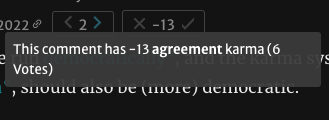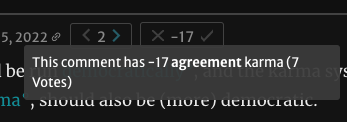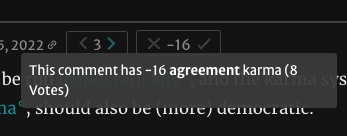I thought I'd run the listening exercise I'd like to see.
- Get popular suggestions
- Run a polis poll
- Make a google doc where we research consensus suggestions/ near consensus/consensus for specific groups
- Poll again
Stage 1
Give concrete suggestions for community changes. 1 - 2 sentences only.
Upvote if you think they are worth putting in the polis poll and agreevote if you think the comment is true.
Agreevote if you think they are well-framed.
Aim for them to be upvoted. Please add suggestions you'd like to see.
I'll take the top 20 - 30
I will delete/move to comments top-level answers that are longer than 2 sentences.
Stage 2
Polis poll here: https://pol.is/5kfknjc9mj





